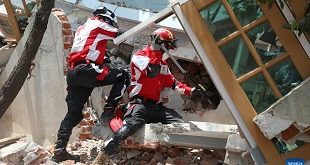
Brussels, Belgium | Xinhua | The European Union on Thursday imposed more sanctions on Russia over its conflict with Ukraine, including a ban on gold imports and the tightening of export controls on high-technology goods.
The “reinforced, prolonged EU sanctions against the Kremlin send a strong signal to Moscow: we will keep the pressure high for as long as it takes,” European Commission President Ursula von der Leyen tweeted.
EU High Representative for Foreign Affairs Josep Borrell described the additional sanctions as “another important step to curtail Russia’s capacity to continue and finance its war of aggression against Ukraine.”
“We are effectively banning Russia’s most significant export after energy – Russian gold,” Borrell said in a statement.
At the same time, the EU was extending the exemption of transactions for agricultural products and the transfer of oil to third countries, he said.
“The EU is doing its part to ensure we can overcome the looming global food crisis. It is up to Russia (now), to stop bombing Ukraine’s fields and silos, and stop blocking Black Sea ports,” Borrell said.
The package also extends the list of controlled items that may contribute to Russia’s military and technological advancement or the development of its defense and security sector, thereby reinforcing export controls on dual-use and advanced technology.
The European Council also decided to add more individuals and entities to the sanctions list and to strengthen reporting requirements.
“The EU firmly stands with Ukraine and will continue to provide strong support for Ukraine’s overall economic, military, social and financial resilience, including humanitarian aid,” according to a statement issued by the Council of the European Union.
It also pledged that Russia, Belarus and all those responsible for war crimes “will be held to account for their actions, in accordance with international law.”
 The Independent Uganda: You get the Truth we Pay the Price
The Independent Uganda: You get the Truth we Pay the Price



